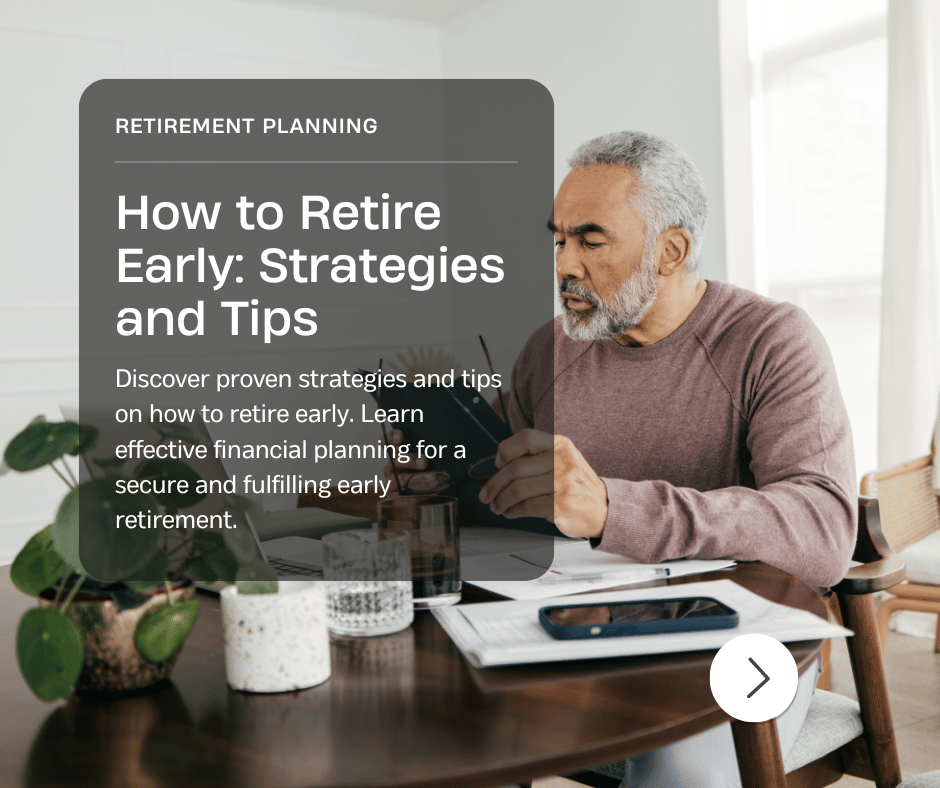How to Retire Early: Strategies and Tips
Meta Description: Discover proven strategies and tips on how to retire early. Learn effective financial planning for a secure and fulfilling early retirement.
Retiring early is a dream for many. It represents freedom, a chance to pursue passions, and an opportunity to enjoy life on one’s terms. But how can one achieve this dream? This comprehensive guide explores strategies and tips on how to retire early, focusing on financial planning, saving, investing, and lifestyle adjustments.
Understanding Early Retirement
What Does It Mean to Retire Early?
Retiring early means leaving the workforce before the traditional retirement age, often around 65. It could be as early as 40 or 50, depending on individual goals and financial circumstances. Early retirement requires meticulous planning, disciplined saving, and strategic investing.
Benefits of Early Retirement
The advantages of early retirement are numerous. It allows for more time to travel, pursue hobbies, volunteer, or start a new venture. It can also lead to a healthier lifestyle, as there’s more time to focus on physical and mental well-being. Moreover, it provides an opportunity to escape the daily grind and stress of a traditional job.
Common Misconceptions
One common misconception is that early retirement is only for the wealthy. However, with careful planning and disciplined saving, many can achieve this goal. Another misconception is that early retirees will become bored. In reality, many find fulfillment in activities they were too busy for during their working years.
Financial Planning for Early Retirement
Importance of Financial Planning
Financial planning is the cornerstone of early retirement. It involves setting clear goals, creating a budget, and estimating retirement needs. Without a solid financial plan, the dream of early retirement can quickly become a financial nightmare.
Setting Clear Retirement Goals
Define what early retirement means to you. How much income will you need? What lifestyle do you envision? Answering these questions will help create a roadmap for your financial planning.
Creating a Detailed Budget
A detailed budget helps track income and expenses, ensuring you save enough for retirement. Include all possible expenses, from daily living costs to unexpected emergencies. A well-thought-out budget is essential for maintaining financial stability.
Calculating Retirement Needs
Estimate how much you’ll need to retire comfortably. Consider factors like inflation, healthcare costs, and life expectancy. Use retirement calculators to get a clearer picture of your financial needs.
Saving and Investing
Building a Strong Savings Habit
Consistently saving a portion of your income is crucial. Aim to save at least 20% of your earnings. Automate savings to ensure a portion of your paycheck goes directly into a savings or investment account.
Effective Investment Strategies
Investing wisely can significantly boost your retirement savings. Diversify your investments to spread risk. Consider stocks, bonds, mutual funds, and real estate. Regularly review and adjust your portfolio to align with your retirement goals.
Understanding Compound Interest
Compound interest can exponentially grow your savings. The earlier you start investing, the more time your money has to grow. Even small, regular contributions can lead to substantial growth over time.
Diversifying Investment Portfolio
Diversification reduces risk by spreading investments across various assets. A diversified portfolio can weather market fluctuations better than a concentrated one. Include a mix of high-risk, high-reward assets and stable, low-risk ones.
Reducing Expenses
Importance of Cutting Costs
Cutting unnecessary expenses accelerates savings. Review your spending habits and identify areas where you can cut back. Small savings can add up over time, significantly boosting your retirement fund.
Practical Ways to Reduce Daily Expenses
Look for ways to save on daily expenses. Cook at home instead of eating out, use public transportation, and shop for deals. These small changes can lead to significant savings.
Living a Frugal Lifestyle
Embrace frugality by prioritizing needs over wants. Focus on value rather than price. A frugal lifestyle doesn’t mean deprivation; it’s about making mindful choices that align with your financial goals.
Downsizing for Savings
Consider downsizing your home or lifestyle to save money. A smaller home means lower mortgage payments, utility bills, and maintenance costs. Downsizing can free up funds for savings and investments.
Maximizing Income
Side Hustles and Part-Time Jobs
Supplement your income with side hustles or part-time jobs. This extra income can be funneled directly into your retirement savings. Explore opportunities that align with your skills and interests.
Investing in Passive Income Sources
Passive income sources, such as rental properties, dividends, or royalties, provide ongoing income with minimal effort. Investing in these can create a steady income stream for retirement.
Monetizing Hobbies and Skills
Turn hobbies and skills into income-generating ventures. Whether it’s freelance writing, crafting, or consulting, monetizing your passions can add to your retirement fund.
Real Estate Investments
Real estate can be a lucrative investment. Consider rental properties, REITs, or flipping houses. Real estate offers both income potential and asset appreciation, making it a valuable addition to your retirement portfolio.
Debt Management
Importance of Becoming Debt-Free
Being debt-free is essential for financial independence. High-interest debt can erode savings and limit your ability to invest. Prioritize paying off debt to free up funds for retirement.
Strategies for Paying Off Debt
Use strategies like the snowball or avalanche method to pay off debt. Focus on high-interest debts first to save on interest payments. Consolidate debts to simplify payments and potentially reduce interest rates.
Avoiding New Debt
Avoid accumulating new debt by living within your means. Use credit responsibly and focus on saving rather than borrowing. A debt-free lifestyle accelerates your path to early retirement.
Using Debt Consolidation
Debt consolidation can simplify your payments and reduce interest rates. Combine multiple debts into one loan with a lower interest rate. This makes managing debt easier and more cost-effective.
Retirement Accounts and Savings Plans
Understanding 401(k) and IRA
401(k) and IRA accounts offer tax advantages and are essential for retirement savings. Understand the differences and benefits of each. Maximize contributions to take full advantage of employer matches and tax benefits.
Maximizing Contributions
Contribute the maximum allowed to retirement accounts. This not only boosts savings but also provides tax benefits. Aim to increase contributions as your income grows.
Benefits of Roth IRA
A Roth IRA offers tax-free withdrawals in retirement. Contributions are made with after-tax dollars, allowing your investments to grow tax-free. This can be particularly beneficial if you expect to be in a higher tax bracket in retirement.
Utilizing Health Savings Accounts (HSA)
HSAs offer triple tax advantages: contributions are tax-deductible, growth is tax-free, and withdrawals for medical expenses are tax-free. An HSA can be a valuable tool for managing healthcare costs in retirement.
Healthcare Planning
Importance of Health Insurance
Health insurance is crucial in retirement to cover medical expenses. Choose a plan that fits your needs and budget. Consider long-term care insurance to protect against high costs of extended care.
Choosing the Right Health Plan
Compare health plans based on coverage, cost, and benefits. Consider factors like premiums, deductibles, and out-of-pocket costs. A comprehensive health plan can save money and provide peace of mind.
Planning for Long-Term Care
Long-term care can be expensive. Plan for potential costs by exploring insurance options and saving specifically for long-term care. Early planning can prevent financial strain later in life.
Staying Healthy in Retirement
A healthy lifestyle can reduce healthcare costs. Focus on regular exercise, a balanced diet, and preventive care. Staying healthy not only saves money but also improves quality of life.
Lifestyle Adjustments
Embracing Minimalism
Minimalism simplifies life and reduces costs. Focus on experiences rather than possessions. A minimalist lifestyle can lead to financial freedom and a more fulfilling retirement.
Traveling on a Budget
Travel is a common retirement goal. Plan budget-friendly trips by looking for deals, traveling during off-peak times, and exploring less expensive destinations. Budget travel allows you to enjoy experiences without breaking the bank.
Engaging in Low-Cost Hobbies
Hobbies can be fulfilling and inexpensive. Consider activities like gardening, hiking, or reading. Engaging in low-cost hobbies provides enjoyment without straining finances.
Building a Community
Building a social network enhances retirement. Join clubs, volunteer, or participate in community events. A strong community provides support and enriches retirement life.
Social Security and Pensions
Understanding Social Security Benefits
Social Security provides a safety net in retirement. Understand how benefits are calculated and the best time to claim. Maximizing Social Security can significantly impact your retirement income.
Strategies for Maximizing Benefits
Delay claiming Social Security to increase benefits. Consider spousal benefits and how your work history impacts payments. Strategic claiming can maximize your Social Security income.
The Role of Pensions
Pensions provide a stable income in retirement. Understand your pension plan and how it fits into your overall retirement strategy. Plan for pension income to ensure financial stability.
Planning for Pension Income
Calculate expected pension income and how it integrates with other savings. Ensure your pension benefits align with your retirement goals. Planning for pension income helps maintain financial security.
Tax Planning for Early Retirement
Understanding Tax Implications
Early retirement can have tax implications. Understand how different income sources are taxed and plan accordingly. Effective tax planning can minimize your tax burden.
Tax-Advantaged Accounts
Utilize tax-advantaged accounts like IRAs and HSAs. These accounts offer tax benefits that can enhance your retirement savings. Strategic use of these accounts reduces taxable income.
Strategies to Minimize Taxes
Consider strategies like tax-loss harvesting, Roth conversions, and charitable giving to minimize taxes. Work with a tax advisor to optimize your tax strategy.
The Importance of Tax Planning
Tax planning is crucial for maintaining financial health in retirement. Regularly review your tax strategy to ensure it aligns with your financial goals. Effective tax planning can enhance your retirement savings.
Early Retirement Case Studies
Success Stories
Learn from those who have successfully retired early. Their experiences provide valuable insights and inspiration. Success stories highlight different paths to early retirement.
Lessons Learned
Understand the challenges and triumphs of early retirees. Learn from their mistakes and successes. Applying these lessons can improve your own retirement strategy.
Common Pitfalls
Identify common pitfalls early retirees face, such as underestimating expenses or overestimating income. Avoiding these pitfalls can lead to a smoother retirement journey.
How to Avoid Mistakes
Plan thoroughly and seek professional advice to avoid mistakes. Regularly review and adjust your retirement plan. Proactive planning prevents costly errors.
Conclusion
Recap the key strategies for early retirement: financial planning, saving, investing, and lifestyle adjustments. Emphasize the importance of starting early and staying disciplined. Encourage readers to pursue their dream of early retirement with confidence and determination.
FAQs
How much money do I need to retire early? The amount varies based on lifestyle, location, and retirement goals. Generally, aim for 25-30 times your annual expenses saved.
What are the best investments for early retirement? Consider a diversified portfolio including stocks, bonds, real estate, and mutual funds. Focus on long-term growth and risk management.
How can I reduce expenses for early retirement? Adopt a frugal lifestyle, cut unnecessary costs, downsize your home, and prioritize needs over wants. Small savings add up over time.
What are some good side hustles for extra income? Consider freelancing, consulting, tutoring, or monetizing hobbies. Look for opportunities that align with your skills and interests.
Is it necessary to have health insurance in retirement? Yes, health insurance is crucial to cover medical expenses and protect against high healthcare costs. Explore different plans and choose one that fits your needs.
How can I avoid running out of money in early retirement? Plan meticulously, save consistently, invest wisely, and adjust your budget as needed. Regularly review your financial plan to ensure sustainability.

